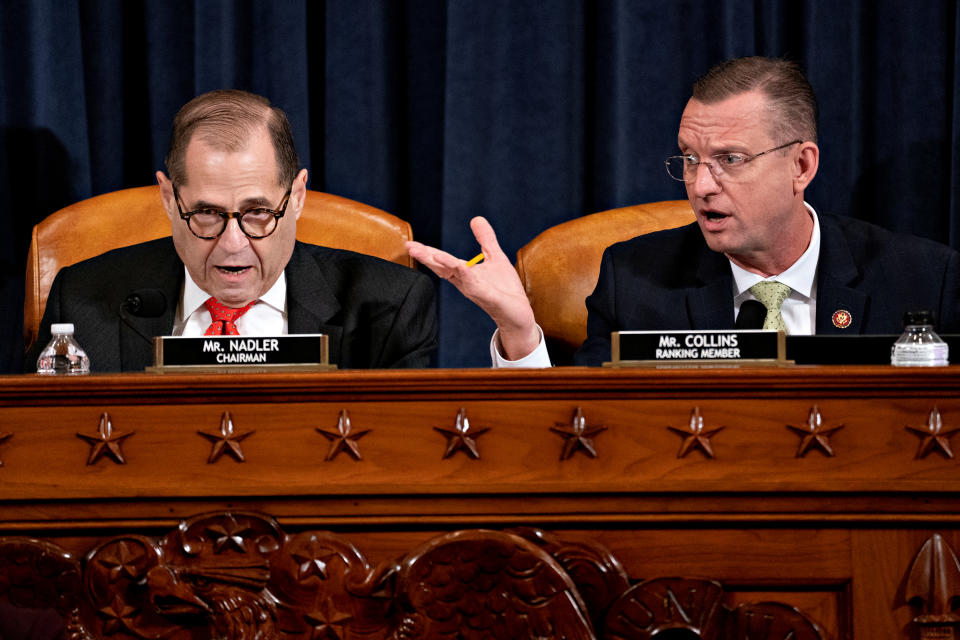House impeachment hearing grinds toward final vote
WASHINGTON — The 10th and final public impeachment hearing in the House lurched forward Thursday, as the House Judiciary Committee moved toward a vote that would send articles of impeachment to the full House floor for a final vote next week.
Democrats and Republicans debated the nine-page text of the articles of impeachment that were released on Tuesday, making amendments and trading barbs.
But the mood was more subdued and less contentious overall than the previous two hearings in the Judiciary Committee, since Democrats were not expected to make any significant changes to the articles and Republicans did not have enough votes on the committee to force any alterations.
“This committee finally accomplished its goal,” said Rep. Doug Collins, R-Ga., the top Republican on the committee, mocking Democrats who he said have wanted to impeach President Trump since his inauguration in 2017.
Collins made a spirited speech in the hearing’s first half-hour, calling the impeachment process a “travesty” because Republicans were not allowed to call witnesses they wanted to. Collins said Democrats had “sounded the death of minority rights” on the committee. But his complaint ignored the fact that many of the denials Democrats made to Republican requests throughout the impeachment process were based on changes to rules that Republicans made while in power over the past decade.

Rep. Zoe Lofgren, D-Calif., and Rep. Sheila Jackson Lee, D-Texas, made rebuttals to the Republican points on historical precedent, relying on their unique status as two of the five members on the 41-person committee to have served on the Judiciary Committee during the 1998 impeachment of President Bill Clinton.
Lofgren compared Republican arguments in favor of impeaching Clinton in 1998 with their arguments now against impeaching Trump, saying their logic was that “somehow lying about a sexual affair is an abuse of presidential power, but the misuse of presidential power to get a benefit somehow doesn’t matter.”
Lofgren took a shot at Trump over the allegation by the president’s former personal lawyer Michael Cohen, who has said he paid porn star Stephanie Clifford, aka Stormy Daniels, $130,000 in hush money to keep her from talking about her affair with Trump.
“If it’s lying about sex, we could put Stormy Daniels’s case ahead of us. We don’t believe that’s a high crime and misdemeanor,” Lofgren said.
The two Republicans on the committee present in 1998 — Reps. James Sensenbrenner of Wisconsin and Steve Chabot of Ohio — argued back.
“Bill Clinton lied to a grand jury. That is a crime,” Sensenbrenner said.
The back-and-forth was spirited but far less charged than on Monday, when Judiciary Committee Chairman Jerry Nadler, D-N.Y., had to gavel down interruptions and objections from Republicans.
As the debate went on, there were occasional fireworks, as freshman lawmakers like Rep. Matt Gaetz, R-Fla., and Rep. Pramila Jayapal, D-Wash., sparred; Rep. Jim Jordan, R-Ohio, interrupted in violation of the rules; and Nadler began to make more ample use of his gavel.

The hearing began with a reading of the articles of impeachment. Democrats are charging Trump with abuse of power and obstruction of Congress. They say the president used a White House meeting and military assistance as leverage to pressure the Ukrainian government to announce an investigation into Joe Biden, an attempt to coerce a foreign power into helping himself get reelected by hurting a domestic political rival.
“We’re here today because the president abused his power,” said Rep. Hakeem Jeffries, D-N.Y., noting that Trump publicly invited Russian interference in the 2016 election and has publicly stated he’d like China to investigate Biden as well. Biden is the leading Democratic candidate for president.
And the articles of impeachment allege that no president has ever refused to comply with a congressional investigation to the degree that Trump has in categorically rejecting requests and subpoenas for witnesses’ testimony and document production.
The hearing was expected to drag on as long as Republicans chose to file amendments, with each member allowed five minutes if they decided to speak. Nadler’s first amendment was to change the use of “Donald J. Trump” in the articles to “Donald John Trump.” Jordan offered an amendment to strike the first article of impeachment.

The House Intelligence Committee held seven public hearings over five days in November, hearing witness testimony from 12 people. This built the fact record beyond an initial whistleblower complaint filed on Aug. 12 and released publicly in early September that led to the release of a call record of the July 25 phone conversation between Trump and Ukraine’s president.
House Speaker Nancy Pelosi has not said which day next week the House will vote on articles of impeachment, or how much debate there will be ahead of the vote. Democrats have said they expect to lose about a half-dozen votes on their own side, but the only impact of that will be political, as Republicans will argue there is bipartisan opposition to impeachment. But Democrats have a 233-to-197 majority and will be able to pass impeachment easily.
An impeachment in the House would be a significant historical moment. Only two other presidents have been impeached. But it will not remove Trump from office. Impeachment would go to the Senate for a trial in January.
In the Senate, 67 votes are required to remove the president from office. Republicans have a 53-to-47 majority in the Senate and are not expected to find him guilty of an impeachable offense.
_____
Download the Yahoo News app to customize your experience.
Read more from Yahoo News:




